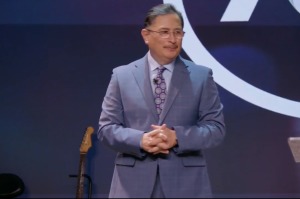University President Denies Pro-'Design' Professor's Appeal for Tenure
Iowa State University (ISU) president Gregory Geoffroy announced Friday that he had denied the appeal for a pro-intelligent design (ID) professor to receive tenure.
Guillermo Gonzalez, professor of astronomy and author of the intelligent design book The Privileged Planet, filed the appeal after he was denied tenure last month, citing that the rejection was based off discrimination for his support of ID – which holds that the biological aspects of life are too complex to have evolved randomly, but must have been produced by an unidentified intelligence.
ISU faculty has stood by its position, however, stating that they have a right to select who is suitable for their permanent staff.
"I independently concluded that he simply did not show the trajectory of excellence that we expect in a candidate seeking tenure in physics and astronomy – one of our strongest academic programs,'' explained Geoffroy in a statement.
Supporters of Gonzalez are expressing the opposite, however, in defense of the astronomy scientist. They say that he is more than qualified for receiving tenure, and have argued that he is even more so qualified than professors already on the ISU staff.
"It's a sad day for science and free inquiry when tenure is denied to a scientist of Guillermo Gonzalez's caliber," said Dr. John G. West, associate director of the Center for Science & Culture for the ID think tank Discovery Institute. "President Geoffroy has clearly demonstrated that academic freedom is not as important to Iowa State University as passing an ideological litmus test."
Gonzalez, who is also a senior fellow at the Discovery Institute, has a list of credentials that many say are more than enough to grant him tenure.
He has written 68 peer-reviewed journals (53 more than the 15 required by his department to meet its standard of excellence in research), helped in the discovery of two planets, helped build technology that discovered extrasolar planets, and wrote a college-level astronomy textbook published by Cambridge University.
According to the Smithsonian/NASA Astrophysics Data System (ADS), which calculates the scientific impact of scientists in astronomy, the ID advocate had the highest score among the entire faculty in the ISU astronomy department. The number is based off how often a scientist's papers are cited by other researchers. He also has the top ranked "h-index," which also measures the number of citations, according to The Chronicle of Higher Education.
The astronomy professor has explained that he does not teach ID thought in his classes, but that it is completely extracurricular work.
Still, several of the professors that chose not to grant tenure to Gonzalez have admitted that ID was the key factor to his denial, despite the fact that some of them have voiced much respect for the work he has done.
"[Gonzalez] is very creative, intelligent and knowledgeable, highly productive scientifically and an excellent teacher," wrote John Hauptman, a colleague to the ID advocate, in an editorial. "An assistant professor at a university has every right to pursue whatever investigations he or she so chooses to investigate. There must be no bounds, no restrictions and no penalties for research of any kind.
"[But] intelligent design is not even a theory. It has not made its first prediction, nor suffered its first test by measurement. Its proponents can call it anything they like, but it is not science," added Hauptman. "It is purely a question of what is science and what is not, and a physics department is not obligated to support notions that do not even begin to meet scientific standards."
Those backing Gonzalez have called this kind of policy hypocritical, however, in that one's outside research does not have "no bounds" if they are then punished for their beliefs in a professional setting.
"Americans like to think of our university system as a haven for unimpeded truth-seeking, where tenured professors press the boundaries of knowledge, no holds barred," explained David Klinghoffer, a senior fellow at Discovery Institute, in an op-ed column. "The picture is attractive but false when it comes to scholarly consideration of big questions such as: Is the universe meaningful?"
ISU is one of the many schools that have already drafted a policy refuting ID as science. According to professors at the school, ISU did not want to be aligned with the contested idea, but Gonzalez had given the university a reputation of being an "ID school."
The ID-astronomer was one of only three professors out of a total 66 not to receive tenure throughout all of ISU's applicants. Typically, those individuals who do not receive tenure leave the university they are working at.
He has 20 days to decide whether to appeal Geoffroy's decision to the Iowa State Board of Regents.
Geoffroy said that because the issue of tenure is a personnel matter, he was not able to share the rationale for his decision with the public.



























